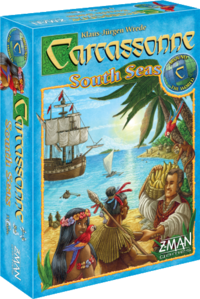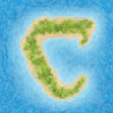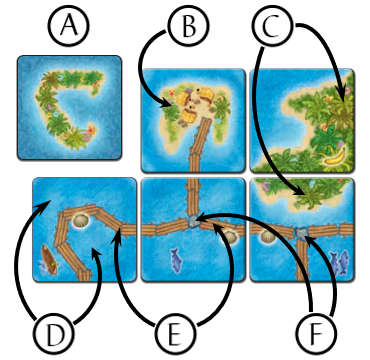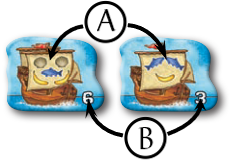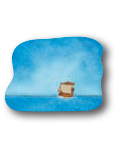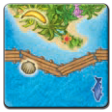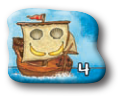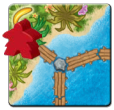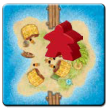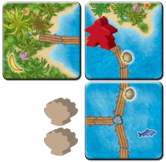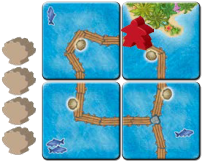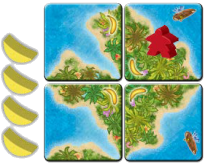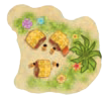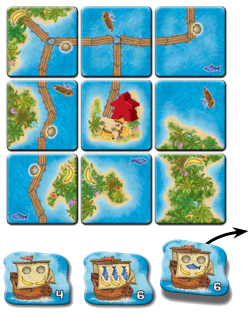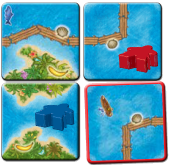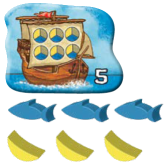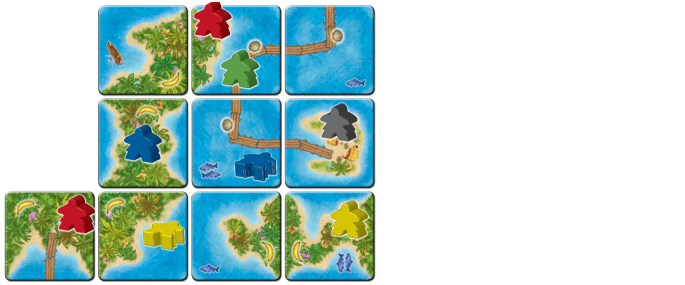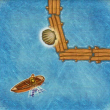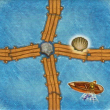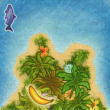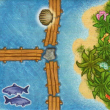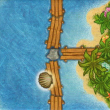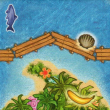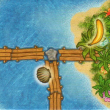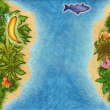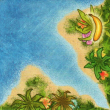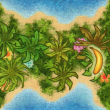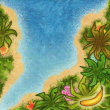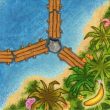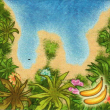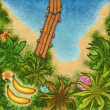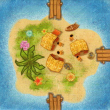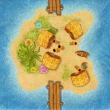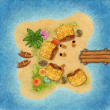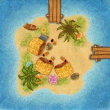South Seas Base Game
 |
You are reading the rules for this tile design. |  |
| If your tiles look like this, you have regular Carcassonne tiles. |  |
| If your tiles have a different design, then choose a game from Spin-offs. |  |
South Seas – Clear blue waters flow effortlessly around seemingly countless islands all connected by a sophisticated network of bridges. It is here that the busy people who inhabit this heavenly paradise frolic around to gather the gifts granted to them by nature. Fish from the sea, bananas from the islands, and the bridges are crowded with shell collectors showing off their latest find. From time to time, merchant ships will dock at the island in search of cargo: the islander that supplies the merchants with the wares they seek is well rewarded for their trouble.
General Info and Comments
Originally released by Hans im Glück in 2013, Carcassonne: South Seas is a clever tile-laying game set in an island paradise for 2 to 5 players, ages 8 and up.
Game Components
- 73 Sea tiles (including 1 Start tile with a more florid backside): They feature bridges with shells, islands with bananas, and seas with fish.
- 24 Ship tokens: They indicate which Wares must be delivered in order to score the indicated points.
- 1 rulebook
- 60 wooden Ware tokens (10 large and 10 small of each type): Each small ware token is worth 1 Ware of that type. Each large ware token is worth 3 Wares of that type.
- 19 Fishing boat tokens
- 20 wooden Islanders (4 each in 5 colors): Each Islander can serve as a Banana Picker, a Shell Collector, a Fisherman or a Merchant.
Game Overview
The players take turns placing Sea tiles on the table. These tiles create Bridges, Islands, Sea Regions, and Markets on which the players may place their Islanders in order to collect the various Wares. At the end of each turn, the active player may choose to deliver Wares to a Ship in order to score points. Once all of the Sea tiles have been placed or all the Ships have been supplied with Wares, the game is over and the player with the most points is crowned King of the South Seas.
Game Setup
- The Start tile is placed in the middle of the table. The remaining tiles are mixed and placed in several stacks so that each player may easily draw tiles.
- The Ship tokens are mixed separately and form a face-down supply. Draw and reveal 4 Ship tokens and place them face up on the table within easy reach of all players.
- Each player receives 4 Islanders in their chosen color and places them in front of themselves as a supply.
- The youngest player begins the game.
Playing the Game
Play proceeds clockwise from the start player. Each player carries out their turn in the following sequence:
![]() 1. The player must draw 1 Sea tile and place it according to the Sea tile placement rules.
1. The player must draw 1 Sea tile and place it according to the Sea tile placement rules.
![]() 2a. The player may place 1 Islander from their supply on the tile they just placed OR
2a. The player may place 1 Islander from their supply on the tile they just placed OR
![]() 2b. The player may retrieve 1 Islander from a Sea tile and place it back in their supply. (A player may also choose not to place or retrieve an Islander.)
2b. The player may retrieve 1 Islander from a Sea tile and place it back in their supply. (A player may also choose not to place or retrieve an Islander.)
![]() 3. If the placed tile causes 1 or more occupied Bridges, Islands, Sea Regions or Markets to be completed, OR a Fishing Boat is added to an occupied Sea Region, an evaluation occurs and Wares or Ships are awarded.
3. If the placed tile causes 1 or more occupied Bridges, Islands, Sea Regions or Markets to be completed, OR a Fishing Boat is added to an occupied Sea Region, an evaluation occurs and Wares or Ships are awarded.
![]() 4. The player may now deliver Wares to 1 of the face-up Ships and score the corresponding points.
4. The player may now deliver Wares to 1 of the face-up Ships and score the corresponding points.
Then, the next player takes their turn.
The rules are similar to those of the original Carcassonne game. Experienced Carcassonne players may feel free to skip to next.
 1. Draw and place a tile
1. Draw and place a tile
The first action a player must take on their turn is to draw a Sea tile from a face-down stack and place it connected to previously placed tiles. The following placement rules must be observed:
- The new tile (bordered with red in the following examples) must connect one or more of its four sides to those of previously placed tiles. A placement that connects only by corners is not allowed.
- New tiles must always continue pre-existing Bridges, Islands and/or Sea Regions.
A player may freely show their opponents their newly drawn tile in order to discuss placement options. In the rare case that a newly drawn tile may not be legally placed, it is removed from the game and the active player will draw a new tile to continue their turn.
 2a. Place an Islander
2a. Place an Islander
After a player has placed a Sea tile, they may place an Islander according to the following rules:
- Only 1 Islander may be placed.
- The Islander must come from the player’s supply.
- The Islander may only be placed on the newly placed tile.
- The player must choose on which part of the newly placed tile they wish to place an Islander. Either as a…
The player may not place an Islander on a Bridge, Island or Sea Region if it is connected to a Bridge, Island or Sea Region that already contains one or more Islanders (even if some or all of the pre-existing Islanders belong to the active player). For example:
Note: If a player does not have any Islanders available in their supply, they do not have the option of placing one. No need to worry: There are several ways of retrieving those Islanders. Read on.
 2b. Retrieve an Islander
2b. Retrieve an Islander
If a player places no islander during their turn, they may instead retrieve one of their Islanders from the board and return it to their supply. No Wares or Ships are awarded.
Note: A player may choose to neither place nor retrieve an Islander. [1]
 3. Completed bridges, islands, sea regions, and markets are evaluated
3. Completed bridges, islands, sea regions, and markets are evaluated
When evaluating a completed feature, a player receives no points. Instead, Wares are awarded. Each type of feature gives a player a different type of Ware, or a Ship in the case of a completed Market.
Upon completion of a Bridge, Island or Sea Region, the player whose Islander occupy the completed feature receives Wares. Each player receives 1 Shell, 1 Banana or 1 Fish for each corresponding symbol present in the completed feature.
A completed bridge gives shells 
A Bridge is complete when it is terminated on both ends, either by a junction (identified by the presence of a junction stone), an Island or a Market, or if the bridge forms a closed loop. This can result in bridges being very small or very large.
A completed island gives bananas 
An Island is complete when all of its borders are complete and there are no internals gaps. This can result in Islands being very small or very large.
A completed sea region gives fish 
A single Sea Region can consist of numerous tiles. A Sea Region evaluation can be triggered in two different ways:
- 1. When a Sea Region is completely enclosed (by Bridges and/or Islands). OR
- 2. When a Sea tile featuring a Fishing Boat is placed in an occupied Sea Region.
Important! A Fishing boat can only trigger an evaluation when it is first placed, and never during a later turn.
After Fish are awarded due to the placement of a Fishing Boat, the player covers one group of Fish in the corresponding Sea Region. If any groups of two fish are available, one of them must be covered. If no groups of two fish are available, a single fish is covered instead. Fish that have been covered by boats are not available to be gained during future evaluations.
A completed market gives a Ship token 
A Market is complete when it is surrounded by 8 Sea tiles.
The player whose Islander occupies the completed Market gains the Ship token with the highest value, without delivering any goods. This token is placed face-down in front of that player and will give them points at the end of the game.
If there is more than one Ship token with the highest value, from these, the player takes one of their choice. The face-up supply of Ship tokens is then replenished to 4.
If several Markets are completed simultaneously, each player will receive the Ship token(s) they are owed in clockwise order from the active player. Replenish the face-up supply of Ship tokens to 4 after each token is awarded.
Multiple Islanders on one completed bridge, island or sea region
Through clever placement of Sea tiles and Islanders, it is possible for several Islanders to occupy the same Bridge, Island or Sea Region.
Similarly, it is possible for multiple Banana Pickers to occupy the same Island, or for multiple Shell Collectors to occupy the same Bridge.
When a feature with multiple Islanders is completed, only the player with the most Islanders present receives the depicted Wares. In case of a tie, all tied players receive the Wares.
Returning Islanders to players' supplies
Note: Islanders in Sea Regions whose evaluation was triggered by the addition of a Fishing Boat are also returned (even though the Sea Region is not necessarily considered "complete").
It is possible for a player to place an Islander, complete a feature and have the Islander return to their supply in one turn.
To do so, players must act in the following sequence:
- 1. With the placement of a new Sea tile, complete an unoccupied Bridge, Island, Sea Region or Market.
- 2. Place a Shell Collector, Banana Picker, Fisherman or Merchant (again, the feature must be unoccupied).
- 3. The completed Bridge, Island, Sea Region or Market is evaluated and the player receives the appropriate reward.
- 4. The Islander is returned to its owner’s supply.
 4. Deliver to a Ship and gain points
4. Deliver to a Ship and gain points
At the end of a player’s turn, he may deliver Wares to exactly 1 Ship. A player may choose from the supply of 4 faceup Ships. The Wares a player must deliver are depicted on the sail of each Ship. To deliver to a Ship, the player returns the appropriate Wares to the supply, and places the Ship face-down in front of him. A new Ship is then drawn so that there are again 4 face-up Ships (unless the pile is empty). The number depicted at the bottom right of the Ship indicates the number of points it is worth at the end of the game.
Some Ships require particular combinations of Wares, while other Ships denote a flexible requirement:
Now, the player’s turn is over and the next player clockwise may begin their turn.
Game End and Winner
The game ends after the turn in which the last Sea tile is placed or the last Ship has been acquired.
Evaluation of incomplete features
All incomplete Bridges, Islands and Sea Regions are evaluated as though they had been completed. Players receive Shells, Bananas and Fish as they would have during the game.
Important: Incomplete Markets offer no reward.
End game scoring and winner
Now we total each player's points:
- Each player receives points for their acquired Ships.
- Each player receives 1 point for each 3 remaining Wares, regardless of type.
Whoever has the most points is crowned King of the South Seas and wins the game.
Clarifications
Credits
Game Design: Klaus-Jürgen Wrede
Art: Christof Tisch
Layout: Harald Lieske, Dennis Lohausen
English Rules Translation: Adam Marostica
Tile Reference
One of the tiles marked with (*) is the starting tile.
The Sea tiles and Ship tokens pictured above feature differing assortments of Wares.
Footnotes
For Icons explanation and licensing please visit Icons page.
